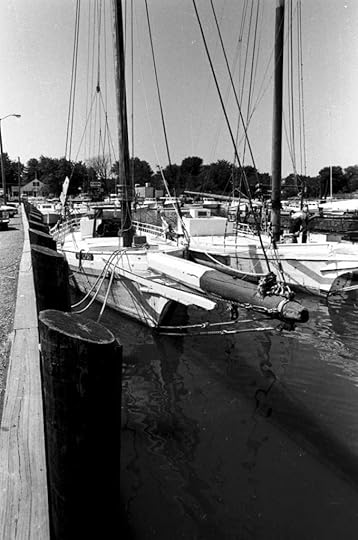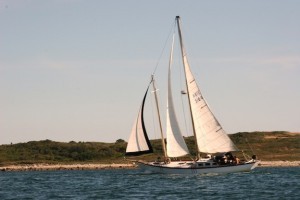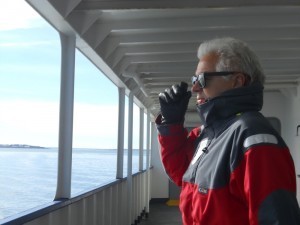Welcome aboard to guest author Randall Peffer

Ruby G. Ford, credit: M.C. Wootton , 07/1984, from Maryland Historic Trust
BLOW??? YOU AIN'T SEEN "BLOW" …
by Randall Peffer
Mid-February and another cold front passage is blasting through southern New England. Winds northwest at twenty-five, gusting to thirty-five. Temp a balmy twenty degrees before you subtract the wind chill.
When I went down to the boatyard this afternoon to check the winter cover on my schooner (she's on the hard until April), a local lobster boat was just tying up at the dock, sheathed in rime ice from battling freezing spray. I could hear the captain and his stern man begging the weather gods for a little mercy as they pounded the ice off the boat with ball peen hammers.
It took me back to my winters as a young man working as a commercial waterman, "drudgin'" oysters from the skipjack Ruby G. Ford out of Tilghman Island, Maryland. As the old, black cook told me the first time I went below to thaw out my frozen rubber gloves (and the fingers inside them) over the propane stove, "They don't call it drudgin' 'cause this here's a right smart mess o' fun, boy."
Amen. Most miserable job I've ever had at sea.
But I was young and green and full of the romance of the sea. So I stuck with drudgin' because my captain Bart Murphy had a sweet way of driving his hundred-year-old skipjack. In a fair breeze she could just lick up her hundred-and-fifty bushel limit almost every morning. I thought I might learn a thing or two about seafaring if I paid attention and didn't fall overboard hauling a dredge. Every day that Bart brought me home safe from another face off with a blizzard or blown-out sails or a swamped push boat felt like a victory and another lesson in survival problem solving. Have you ever been knee-deep in forty-five degree bilge water "chinked up" a brutal leak in a centerboard trunk with a coal chisel and cotton ticking from the first-mate's mattress? My wife told me I was certifiable. My mother prayed for me.
But rarely have I every felt quite so alive. And I must have learned something about sailing workboats and fishing oysters because by mid-season Bart stopped calling me "Dummy," and started paying me a full-share of the catch. When I walked into the Carpenter St. Pub in St. Michaels after work with Bart, splattered in oyster mud, the bartender would tell his patrons to "make room for the Lone Ranger and Tonto." Kind of made me feel like I could be king of the world.
And so it was that my enthusiasm and new-found nautical confidence led me to overstep my bounds.
It happened one particularly nasty morning. A two-foot chop was slamming against the wharf in Knapps Narrows and the wind was howling through the rigging of our old drudge boat when the rest of the crew and I rolled up to the Ruby at 4:30 a.m., hoping against hope that Bart would send us all home, that he was not going to make us put out into a roiling, freezing bay to pound ice with ball peen hammers aboard a wooden sailboat built in the previous century.
"What the hell y'all doing standing around like a bunch of miserable monkeys?" asked Bart when he noticed the five of us in his crew hiding in the lee of an old skipjack run up on shore.
"It's blowin' a gale, Bart," I said in my most practiced Eastern Shore drawl by way of an excuse.
He stiffened. This Popeye of a captain walked into the midst of his crew like a man ready for a fight. I could feel the other guys try to back away as he got up in our faces.
"Blow?" he asked, screwing his eyes into my face. "Blow??? You ain't seen 'blow.'"
His jaw muscles flexed, and I could imagine his fists tightening as he ruminated on my audacity in judging the weather conditions. Clearly such judgments belonged only to a captain and man with infinitely more seafaring experience than I had.
"Listen here," he said. "I seen it blow so hard one time down at Hooper Straits, it sunk three boats. It drowned seven men … And it blowed a chicken into a bottle."
Damn.
And with that pronouncement, I saw a twinkle flash in his eyes, a smile ghost across his face, as he turned away and walked toward his skipjack. Almost instantly we scrambled after him to cast off the lines … still chuckling. Somehow Bart's chicken story had taken the sting out of the wind, the fear out of the gale. We could laugh a little at adversity. Put it in perspective. And now we could do our jobs without the kind of emotional interference that is a certain recipe for disaster at sea.
So it is that on days like today when the wind screams of trouble and the air bites steaks out of the cheeks, I always think of Bart's chicken in the bottle. And I know that sometimes we mariners just have to laugh at what the gods throw our way. Only then can we think clearly enough to do whatever it takes to go safely. Even if that means stuffing a leak in a centerboard trunk with an old mattress or pounding ice with a ball peen hammer.
About Randall Peffer

Schooner Sarah Abbot
Holding a 100-ton masters license, Randall Peffer has well over 100,000 miles at sea, mostly in traditional working vessels. He has been the captain of the 55' wooden research schooner Sarah Abbot for twenty-seven years.
Randy is the author of nine crime/romantic suspense novels and eight nonfiction books. His first book, Watermen is a documentary of the lives of the Chesapeake's fishermen. It won the Baltimore Sun's Critic's Choice award and was Maryland Book of the Year. His novel Provincetown Follies, Bangkok Blues was a Lambda Award finalist and has been optioned for film.
Screams & Whispers (Aug, 2011) is the sixth novel in Randy's Cape Islands Mystery series. Like the other books in the series, this novel features police, lawyers and commercial fishermen from Massachusetts' south coast, Cape Cod and the islands.
He is the author of over 300 travel-lifestyle features for magazines like National Geographic, National Geographic Traveler, Smithsonian, Reader's Digest, Travel Holiday, Islands, Sail and Wooden Boat. His travel features appear in most of the US major metro dailies.
Randy's Civil War naval thriller trilogy Southern Seahawk launched in Nov, 2008. These historical novels feature the Confederate raider Raphael Semmes, the most successful naval predator in history. The third novel in the trilogy SEAHAWK BURNING (Tyrus Books)will be in stores and online in April 2012.
Randy teaches writing and literature at Phillips Academy, Andover. He sails out of his homeports of Marion, Massachusetts and Great Guana Cay, Abaco.
Share on Facebook



